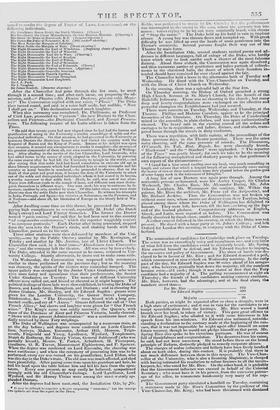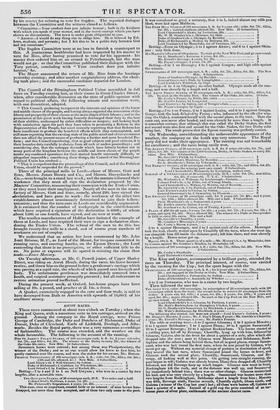The nomination of candidates for Cambridge took place on Tuesday.'
The scene was an exceedingly noisy and tumultuous one, and very little of what fell from the candidates could be distinctly heard. Mr. Spring Rice exerted himself to defend, and Sir Edward Sugden to impugn, the measures and policy of Government. The show of hands was de- clared to be in favour of Mr. Rice ; and Sir Edward demanded a poll, which commenced at nine o'clock on Wednesday morning. In the early pant of the day, Sir Edward Sugden was 90 votes ahead of his antagces nist ; who, however, gradually beat down the majority, till the numbers became even—al I ends; though it was stated at first that the Tory candidate had a majority of 4. The polling recommenced at eight on Thursday; the friends of both candidates making extreme exertions. Mr. Rice, however, bad the advantage; and at the finial close, the numbers stood thus— For Mr. Rice Sir Edward Sugden Majority .25 . Both parties, as might be expected after so close a struggle, were in a high state of excitement; and it was in vain for the candidates to at- tempt speechification from the hustings. Mr. Rice waved a laurel branch over his head, in token of victory. This gave great offence to Sir Edward Sugden; who alluded to it with sonie bitterness in his speech from his inn-windows. Sir Edward also intimated, notwith- standing a declaration to the contrary made at the beginning of the can- vass, that it was not impossible he might again offer himself on some future vacancy, though he would not pledge himself on that point. Mr, Spring Rice also spoke to his victorious partisans. He was of course full of thankfulness and congratulation. 'The deserters from his cause, he said, had not been numerous. He stood before them on the broad principle of Reform, distinctly pledged to remedy corporate abuses. The charges of undue influence and bribery have been freely bandied about on both sides, during this contest. It is probable that there is not much difference between them in this respect. The Vice-Chan- cellor of the University, who is also a licensing Magistrate, is charged with having intimated his resolution to refuse licenses to all the tavern- keepers, &c. who voted for Mr. Rice. On the other hand, it is probable that the Government influence was exerted in behalf of the Colonial Secretary ; who must have it in his power, from the extensive patron- age of his office, to remunerate handsomely very many of his sup- porters.
The Government party circulated a handbill on Tuesday, containing a statement made to Mr. Rice's Committee by the gardener of the VicesChance.lor, Mr. King ; who had been threatened with dismissal
615 590
by his inastel; for refusing to vote for Sugden. The reported dialogue between the Committee and the witness closed Ili follows.
"Committee-Your conduct does you infinite honour ; both in the kindness with which you speak of your master, and in the moral courage which you have shown on this occasion. The town is under great obligations to you. "Answer-1 would do any thing else to oblige him. He is beloved by Fel- lows, students, and servants; but I felt this to be a public duty between God and my conscience."
The Sugden Committee were at no loss to furnish a counterpart to this. A journeyman bookbinder had been requested by his master to vote for Rice, after having promised to vote for his opponent : his roaster then ordered him on all errand to Peterborough, but the man would not go : so that the Committee published their dialogue with the Tory patriot, concluding with " Your conduct does you infinite honour," &c.
The Mayor announced the return of Mr. Rice from the hustings yesterday evening; and after another congratulatory address, the chair- ing took place; and the successful candidate departed for London.



















 Previous page
Previous page